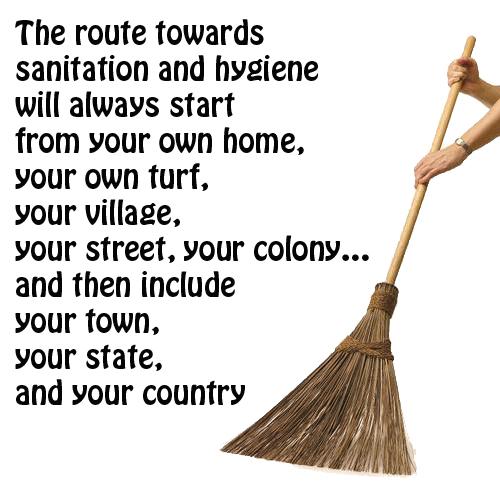As I walked by a pile of garbage lying unattended in an otherwise clean market in Delhi, I heard a well-to-do woman say, ‘We Indians are instinctively unhygienic.’ I stopped, looked at her with a smile that clearly said ‘hear me out’. She instinctively stopped and her body language said ‘I’m ready to hear your defence’. Yes, communication doesn’t need too many words all the time.
I said, ‘Instincts are like the off-shoots of impressions.’ She mulled on this pithy sentence for a few seconds and said, ‘Let us sit somewhere for a coffee and then you can explain what you mean.’ And so, as we sipped our coffee, I told her about ‘cabin cupboard’.
Cabin cupboard
‘I wasn’t always a messiah of sanitation and hygiene,’ I began, and then told her that though I wasn’t the sort who spat on the floor every ten seconds or threw bits of scrap anywhere, I wasn’t addicted to cleanliness, ‘but the first cabin cupboard at the IMA changed it all.’ I went on to tell her that the cabin inspection of the rooms allotted to us at the Indian Military Academy in Dehradun was a regular feature but the first one came as an eye-opener to me.
‘Be extremely careful,’ advised my course senior at the Academy, ‘everything must be in its prescribed place and in the correct direction. Call me when you’re done and I’ll tell you what you’ve missed.’ I knew I was thorough in cleaning my room in the company lines and so I went to my senior in the platoon and asked him to come over and see if everything was done properly. He came, stood on his toes and rubbed his palm on the top of the door. ‘Dusty and dirty,’ he said with a smile. He opened the cupboard shelf and lifted the brown paper I had laid there and asked me to rub my palm on the wooden surface there. I did and said, ‘Dusty and dirty!’
I sighed, looked around, and said, ‘Now I see dirt and dust nearly everywhere.’ That kind senior from Imphal Company, Manekshaw Battalion had just made me realise that cleanliness was indeed a matter of our personal impressions… and that we see only what we have learned to see. So sanitation and hygiene begin from you and then through you… and on that day of my first cabin cupboard I knew why cantonments were neater and cleaner than other areas in a city.
The coffee house
After I had finished telling that woman about how I defined impressions, she simply said, ‘I agree. It is what we see that creates impressions and then shapes our instincts.’
I said, ‘Yes. We need to reprogram our instincts. Mere half-page advertisements don’t help. One speech every now and then makes no difference. We need to have a system in place that makes us do things better. My instincts had a chromosomal change because I did focus on a clean room and did it again and again for the duration that I was there. My actions became my impressions that finally shaped my instincts.’ Well, if this isn’t there we will continue to be populated by people and officials like the OC Spokesperson Lalit Bhanot who said that ‘Indians will find the CWG village clean but the foreigners have a different standard of cleanliness.’
Thus impressions matter. Impressions matter because they arise from what you do, and what you do will stay with you as a guide. Let me prove this point by telling you about my visit to Mawlynnong.
Mawlynnong
Mawlynnong is a village in the East Khasi Hills district of Meghalaya and is known the world over for being Asia’s cleanest village. I had read in a lot of travelogues that even if an unruly tourist throws an empty wrapper anywhere in the village and walks away, it will invariably be picked up by some child there and thrown in a bin.
We had gone to Shillong a few months back… and once there, we decided to visit this clean village as well. No, I did not try throwing any wrapper anywhere to test the story told on blogs but I did go around every bend and every corner to see for myself if neatness was only a façade or deep-seated. Not only did the village live up to its reputation, I also noticed that everyone was willingly helpful.
I asked a small child, ‘Do you have pitcher plants here?’
‘Yes,’ said the child and immediately led my inside a home and into its garden. I saw the first pitcher plant of my life… and even invited by the occupants of the house to stay in the village whenever I come visiting again. ‘We have home stays here and they are comfortable,’ she said, showing me around. Well, it isn’t just sanitation and hygiene of the village that was impressive, they are lucky to have an intriguing root bridge quite near… and a couple of tree houses as well that are also superb watch towers if you want a glimpse of the vast plains in the distance that actually fall in Bangladesh.
The houses in this village have toilets and there are taps for drinking water installed in the school, church, and the community hall besides the water connection that goes to homes. So when a disturbingly high proportion of women and children in most other villages of the country have to go out in the fields, this village cares for its inhabitants. As we walked around, Specky, my wife, said, ‘We really must write about our experiences here. This is a remote village and yet the level of sanitation and hygiene is rather high.’
I said, ‘Yes, the more visitors this village has, the larger will be the impact of an impression that forms attitude and formats instincts. More such villages will mean more people with an awakened sensibility in favour of better hygiene and sanitation.’
Inspired politics
This is quite true and I am happy that the current government is also attempting to make every legislator adopt a village. I know there will be many who will oppose such plans, but imagine the impact of a few thousand clean villages where sanitation and hygiene becomes an accepted norm. The next generation will grow up with impressions that would have already shaped its instincts and we will then hopefully not see ad films where banana peels are flung out of cars going at high speed… we will then not have people spitting out of buses and trains… we will then not have women and children going out in the fields for defecating in the open and being exposed to diseases as well as prying eyes of molesters.
I don’t call the move to make legislators adopt villages, a mere political move… it is inspired politics. Inspired politics is what we can do with. The goodness of an enhanced sense of sanitation and hygiene travels from the self to the others and also from the villages and hamlets to the bigger cities and towns.
My logic is that it is much easier (and faster) to bring about inspired changes in villages… the area is smaller and the population is manageable. These model villages can then be the source where townsfolk come as tourists and learn a thing or two about sanitation and hygiene. In bigger towns it is people who need to spearhead the revolution that will usher in sanitation and hygiene… government regulations and laws can only play a supporting role.
The route towards sanitation and hygiene will always start from your own home, your own turf, your village, your street, your colony… and then include your town, your state, and your country.
.
.
.
This blog post is written to highlight how sanitation and hygiene play a role in our everyday lives… the topic was available for bloggers on indiblogger and sponsored by #SwachhIndia
.
.
.
Arvind Passey
12 December 2014











2 comments
Simbly Bored says:
Dec 20, 2014
Such a wonderful read! I agree with you that we internalize what we see. When I was studying abroad and came back on vacation everything our streets looked so dirty. Now that I’m back permanently, my eyes seem to edit out the piles of garbage everywhere.
Arvind Passey says:
Dec 21, 2014
Thank you reaching out, reading… and even commenting here. Yes, we do need to get our perspectives in an evolved state. 🙂